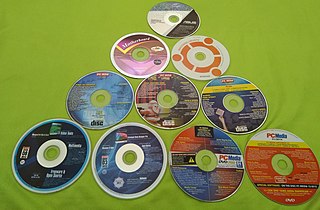Software cracking is an act of removing copy protection from a software. Copy protection can be removed by applying a specific crack. A crack would refer to any tool to enable breaking into a computer network or a software application. Examples of cracks are: applying a patch or by creating reverse-engineered serial number generators known as keygens, thus bypassing software registration and payments or converting a trial/demo version of the software into fully-functioning software without paying for it. Software cracking contributes to the rise of online piracy where pirated software is distributed to end-users through filesharing sites like BitTorrent, One click hosting (OCH), or via Usenet downloads, or by downloading bundles of the original software with cracks or keygens.

MiniDisc (MD) is an erasable magneto-optical disc-based data storage format offering a capacity of 60, 74, and later, 80 minutes of digitized audio.

Super Audio CD (SACD) is an optical disc format for audio storage introduced in 1999. It was developed jointly by Sony and Philips Electronics and intended to be the successor to the Compact Disc (CD) format.
The Beatles' bootleg recordings are recordings of performances by the Beatles that have attained some level of public circulation without being available as a legal release. The term most often refers to audio recordings, but also includes video performances. Starting with vinyl releases in the 1970s, through CD issues in the late 1980s, and continuing with digital downloads starting in the mid 1990s, the Beatles have been, and continue to be, among the most bootlegged artists.

Norah Jones is an American singer, songwriter, and pianist. She has won several awards for her music and, as of 2023, had sold more than 50 million records worldwide. Billboard named her the top jazz artist of the 2000's decade. She has won nine Grammy Awards and was ranked 60th on Billboard magazine's artists of the 2000s decade chart.

DVD-Audio is a digital format for delivering high-fidelity audio content on a DVD. DVD-Audio uses most of the storage on the disc for high-quality audio and is not intended to be a video delivery format.
Copy protection, also known as content protection, copy prevention and copy restriction, describes measures to enforce copyright by preventing the reproduction of software, films, music, and other media.
Terrorvision are an English rock band. They were formed in 1987 in Keighley, West Yorkshire, England, and initially disbanded in 2001. The band used Bradford as a base after the name change to Terrorvision in 1991, by which time the band members had all moved there.

Copy Control was the generic name of a copy prevention system, used from 2001 until 2006 on several digital audio disc releases by EMI Group and Sony BMG Music Entertainment in several regions. It should not be confused with the CopyControl computer software copy protection system introduced by Microcosm Ltd in 1989.

A portable media player (PMP) is a portable consumer electronics device capable of storing and playing digital media such as audio, images, and video files. The data is typically stored on a compact disc (CD), Digital Video Disc (DVD), Blu-ray Disc (BD), flash memory, microdrive, or hard drive; most earlier PMPs used physical media, but modern players mostly use flash memory. In contrast, analogue portable audio players play music from non-digital media that use analogue media, such as cassette tapes or vinyl records.

MediaMax CD-3 is a software package created by SunnComm which was sold as a form of copy protection for compact discs. It was used by the record label RCA Records/BMG, and targets both Microsoft Windows and Mac OS X. Elected officials and computer security experts regard the software as a form of malware since its purpose is to intercept and inhibit normal computer operation without the user's authorization. MediaMax received media attention in late 2005 in fallout from the Sony XCP copy protection scandal.

Covermount is the name given to storage media or other products packaged as part of a magazine or newspaper. The name comes from the method of packaging; the media or product is placed in a transparent plastic sleeve and mounted on the cover of the magazine with adhesive tape or glue.

Nothing Is Sound is the fifth studio album by American alternative rock band Switchfoot. It was released on September 13, 2005 and debuted at number three on the Billboard 200. The first single from the album was "Stars," which was the number one most-added song on Modern Rock Radio and received much airplay on alternative rock stations upon release. A second single, "We Are One Tonight," was released in early 2006, though it did not enjoy much success on the Billboard charts.
People in Planes were a Welsh alternative rock band from Porthcawl, active from 1998 to 2013. They were signed to Wind-up Records. Prior to 2003, they were known as Tetra Splendour, and before that, they went by the name of Robots in the Sky. Their final name was derived from the band's obsession with air travel, which is also present in their song titles and lyrics.

Z is the fourth studio album by psychedelic rock band My Morning Jacket. This collection features a much spacier and more polished sound than previous releases, making heavy use of synthesizers throughout and incorporating reggae and dub influences. The heavy reverb that was a defining characteristic of the band's prior recordings is largely absent. The songs on the album are more focused and shorter compared to the band's previous albums.

Extended Copy Protection (XCP) is a software package developed by the British company First 4 Internet and sold as a copy protection or digital rights management (DRM) scheme for Compact Discs. It was used on some CDs distributed by Sony BMG and sparked the 2005 Sony BMG CD copy protection scandal; in that context it is also known as the Sony rootkit.

A scandal erupted in 2005 regarding Sony BMG's implementation of copy protection measures on about 22 million CDs. When inserted into a computer, the CDs installed one of two pieces of software that provided a form of digital rights management (DRM) by modifying the operating system to interfere with CD copying. Neither program could easily be uninstalled, and they created vulnerabilities that were exploited by unrelated malware. One of the programs would install and "phone home" with reports on the user's private listening habits, even if the user refused its end-user license agreement (EULA), while the other was not mentioned in the EULA at all. Both programs contained code from several pieces of copylefted free software in an apparent infringement of copyright, and configured the operating system to hide the software's existence, leading to both programs being classified as rootkits.
Cactus Data Shield (CDS) is a form of CD/DVD copy protection for audio compact discs developed by Israeli company Midbar Technologies. It has been used extensively by EMI, BMG and their subsidiaries. CDS relies on two components: Erroneous Disc Navigation and Data Corruption.
Digital rights management (DRM) is the management of legal access to digital content. Various tools or technological protection measures (TPM) like access control technologies, can restrict the use of proprietary hardware and copyrighted works. DRM technologies govern the use, modification and distribution of copyrighted works and of systems that enforce these policies within devices. DRM technologies include licensing agreements and encryption.

"Reminiscing" is a song by Australian soft rock music group Little River Band, released in June 1978 as the second single from their fourth studio album Sleeper Catcher. The song was written by the band's guitarist, Graeham Goble, and sung by their lead singer, Glenn Shorrock. "Reminiscing" peaked at number 35 on the Australian Kent Music Report and at No. 3 on the Billboard Hot 100.













